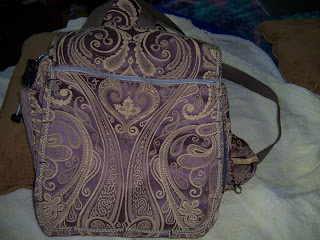 So, one of my fun projects this fall has been to make my own [purse]. Actually, I don't call it a "purse"; but some people I meet call it that (as in, waiters who ask, "would you like a chair to put your purse on?"). Others call it a backpack -- although the thing that I carry around has only one shoulder strap. If it were more business-esque in appearance, I suppose people might call it a briefcase. The prototype for this bag was a long-ago purchased thing that the store called a messenger bag or a courier bag. In our family, we call this thing my planner bag.
So, one of my fun projects this fall has been to make my own [purse]. Actually, I don't call it a "purse"; but some people I meet call it that (as in, waiters who ask, "would you like a chair to put your purse on?"). Others call it a backpack -- although the thing that I carry around has only one shoulder strap. If it were more business-esque in appearance, I suppose people might call it a briefcase. The prototype for this bag was a long-ago purchased thing that the store called a messenger bag or a courier bag. In our family, we call this thing my planner bag.The reason I'm going on and on about all these names is that the name of the object hints at purpose. What does a good purse/messenger bag/briefcase look like to me? That depends on what I'm using it for, of course.
The word "purse" comes from the Old English pursa, meaning "little bag made of leather" -- I think that's where we got the word "bursar", too. (In a somewhat related, but weirder etymology, the word "wallet" probably came from germanic roots meaning "roll", because people rolled their money. Only in the 1800's did a wallet come to mean a flat thing. Go figure.) So I could think of this thing as a way to carry my spending money, which in some sense, it is. But of course it's much more than that. For me, it's so much about organizing my life, that I call it not my "money bag" (purse), but my "planner bag".
But with all the traveling I've been doing lately, not to mention the office-switching that goes with a year on sabbatical, this is the way I've been thinking about my bag lately: it's a transition tool.
Transitions are tough. I've gotten to think about this a lot on my many recent travels. Every trip involves packing and unpacking, which is not generally a stress-free activity, even if the trip itself is supposed to be an adventure or a vacation or other stress-releaser. Making it to the airport, waiting in line at the airport, driving to a new location -- again, not an "ahhh, yesss" kind of feeling for most people.
On a smaller scale, even the daily act of getting out the door in the morning involves a lot of running around on the part of some of my family members. Just the attempt at, say, trying to leave together for church includes a couple of rounds of "we're going in 5 minutes!" warnings, and even with all those warnings, it still almost always results in one of us urging others, "you just leave: I'll catch up!" (It sure is nice that we walk and bike instead of drive, so we can leave separately). For me, packing up to go to my office usually takes about 10 or 15 minutes of concentrated time: personal care followed by item-collection. Hair, shoes, papers, lunch stuff, proper outer clothing.
A good bag helps me with this transition. I don't use my bag while I'm at home; while I'm in my house, the bag sits in my sewing room or next to my bed. I don't use my bag while I'm working in my office; once I get my computer and papers out, I pretty much work at my desk or with students and leave the bag in the "go home stuff" corner. But my bag is over my shoulder whenever I'm going from one place to another: home, office, classroom, store, airport. If I build my bag right, it helps me move from place to place more easily.
 The bag I made a mere two years ago was starting to get holes in the bottom, but even more, I'd designed it thinking I might use it as a bike bag, so it was just poorly designed for my actual daily use. The combination of a not-entirely-ergonomic bag and the relatively open expanse of time that my sabbatical gives me made this a good time to create a new bag.
The bag I made a mere two years ago was starting to get holes in the bottom, but even more, I'd designed it thinking I might use it as a bike bag, so it was just poorly designed for my actual daily use. The combination of a not-entirely-ergonomic bag and the relatively open expanse of time that my sabbatical gives me made this a good time to create a new bag.
No comments:
Post a Comment